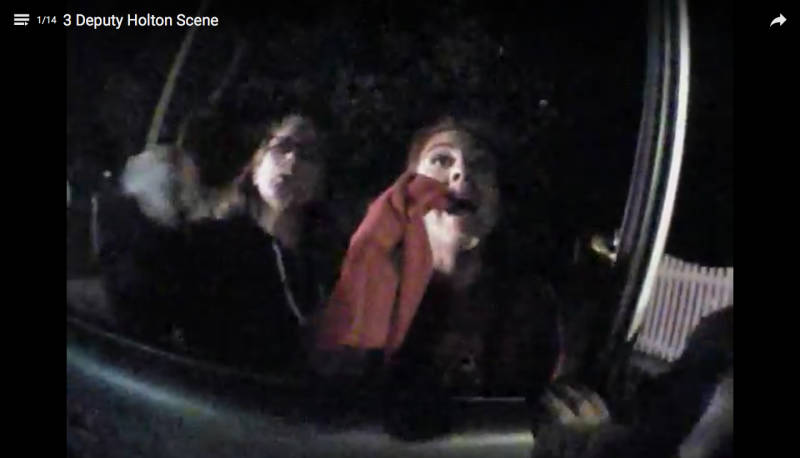Holton was on a rural road in Sonoma County when he came across a parked pickup truck and trailer blocking the road, according to the Sheriff's Office. While he was investigating, he heard a woman's scream from a house nearby and saw a man walking quickly toward the truck as several women shouted at him. Holton suspected "he had encountered a domestic-related incident" because one of the women was crying, according to the Sheriff's Office.
The body-camera footage, from Holton and backup deputies, shows the Lemos family, at their property on Petaluma's Liberty Road, arguing with Holton.
At one point (at about 2:40 in the video) the deputy opens the door of the truck to speak with Karli LaBruzzi, the woman in the passenger seat.
"Officer, what are you doing? You're not allowed to do that," says her 18-year-old sister, Gabrielle Lemos.
The video shows the argument escalate.
A few minutes later (at about 8:40), Holton tackles Lemos, as she was apparently attempting to go back into the house. She was then put in the patrol car, taken to a hospital for cuts and bruises, and then booked into the Sonoma County Jail.
Lemos' phone calls to her mother from jail were also released yesterday. The first recording includes a racial slur against Holton, who is black.
In November, Lemos filed a federal civil rights lawsuit in U.S. District Court in San Francisco, saying Holton's actions violated her right against police brutality and her right to free speech.
One day later the county district attorney's office filed a misdemeanor charge against Lemos for resisting arrest and interfering with an investigation. The move was retaliatory, says Lemos’ lawyer, Izaak Schwaiger.
Robert Weisberg, a co-director at Stanford's Criminal Justice Center, says the claim of retaliation is "legally plausible, but very hard to prove."
The differing perceptions over what the police footage actually shows is, he says, an integral part of the debate over the increasing number of law enforcement body cameras.
"They tend to be promoted by both sides of the equation," Weisberg says. "Police have been persuaded on the whole that these cameras are good for them because most of the time police are acting legally and this protects them against fabricated charges."
For people who complain about police behavior, cameras are a great thing because it shows what awful things the police do, Weisberg says.
"The fact is, both can be true," he says. "But, just statistically, there's going to be some cases where the situation is so ambiguous that the tapes could support either side of the equation."

